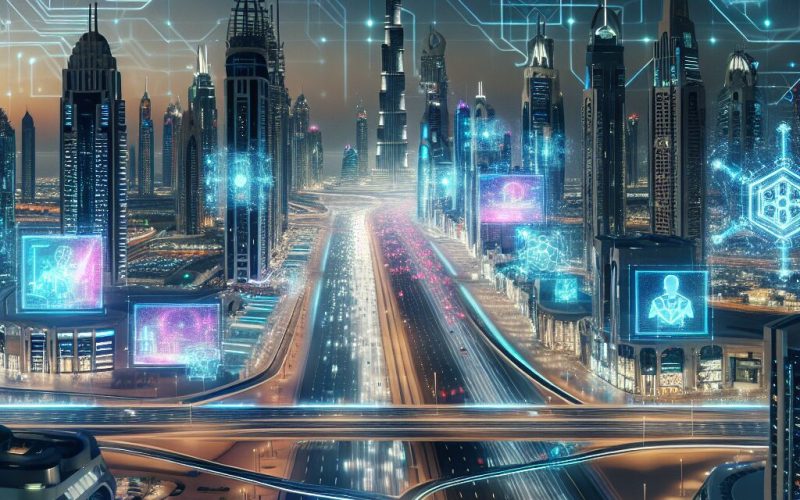“`html
Dubai’s AI Security Policy Leads Digital Transformation Revolution
Dubai is setting a new benchmark in the intersection of artificial intelligence (AI) and cybersecurity. It is not just about keeping up with the times; it’s about paving the way. With innovative AI-driven security policies, Dubai’s digital transformation efforts are revolutionary. But what does this mean for cybersecurity professionals worldwide?
Imagine a city where intelligent algorithms constantly monitor and protect digital infrastructures. The futuristic vision of Dubai is closer than you think! This blog post will delve into the specifics of Dubai’s AI security policies and their implications for global cybersecurity trends.
Emergence of AI in Cybersecurity
The integration of AI in cybersecurity is redefining traditional defense mechanisms. By leveraging machine learning algorithms, systems can now detect anomalies and identify threats faster and more accurately than ever before.
AI-Driven Threat Detection
One of the crucial components of Dubai’s AI Security Policy is AI-driven threat detection. Traditional threat detection methods are often reactive. AI, on the other hand, enables a proactive approach.
- Enhanced Speed: AI systems process vast amounts of data in real-time, identifying potential threats almost instantaneously.
- Accuracy: Machine learning algorithms improve over time, adapting to new threats and reducing false positives.
Machine Learning Algorithms for Anomaly Detection
Machine learning (ML) plays a pivotal role in anomaly detection. It helps in recognizing patterns that deviate from the norm, which often indicates a security breach.
How Does It Work?
By analyzing network traffic and user behavior, ML algorithms can detect unusual activities. Dubai’s security systems utilize this to mitigate risks before they become critical issues.
- Baseline Behavior: The system learns what is ‘normal’ for users and networks.
- Detecting Deviations: Any deviation from this baseline is flagged for further investigation.
Network Security Protocols
Dubai’s AI-driven approach also revolutionizes network security protocols. These protocols ensure that data traveling over networks remains secure and inaccessible to unauthorized users.
Implementation of Secure Protocols
By integrating AI, Dubai ensures that these protocols are not only robust but also adaptable to evolving threats. This includes using AI to continuously update and refine encryption methodologies.
- Dynamic Encryption: AI changes encryption keys regularly, making it harder for attackers to decrypt data.
- Intelligent Scanning: AI scans for vulnerabilities in real-time, providing crucial updates to network security.
Data Protection Strategies
In a digital age, protecting sensitive data is paramount. Dubai leverages AI to enhance data protection strategies, ensuring the integrity and confidentiality of information.
Advanced Data Protection Methods
Dubai’s strategy involves a multi-layered approach. By employing various AI techniques, Dubai ensures that data is not only protected but also resilient against attacks.
- Smart Data Masking: AI-driven masking techniques ensure that sensitive data is unreadable to unauthorized users.
- Informed Decision Making: AI provides insights into data access patterns, helping in making informed security decisions.
Real-World Applications
Dubai’s approach is not just theoretical. Several real-world applications illustrate the efficacy of these policies.
Financial Sector
Banks in Dubai use AI to detect fraudulent activities, minimizing the risk of financial crimes. By analyzing transaction patterns, AI identifies suspicious activities that would be impossible to catch manually.
Smart City Initiatives
As part of its smart city initiatives, Dubai employs AI to secure critical infrastructures like power grids, water supply systems, and public transportation. This ensures the city remains resilient against cyber-attacks, safeguarding public welfare.
Challenges and Future Implications
While Dubai’s AI security policies offer numerous benefits, they are not without challenges. Integrating AI into cybersecurity involves significant investment and ongoing updates to keep pace with rapidly evolving threats.
Addressing Privacy Concerns
As AI systems gather and analyze vast amounts of data, concerns around privacy cannot be ignored. It is crucial to strike a balance between security and privacy, ensuring that AI-driven systems are transparent and comply with data protection regulations.
Keeping Up with Evolving Threats
The dynamic nature of cyber threats means that AI systems must continuously adapt. This requires robust training datasets and ongoing algorithm improvements to stay ahead of malicious actors.
Conclusion
Dubai’s AI security policies highlight a significant shift in the cybersecurity landscape. By leveraging advanced technologies, Dubai is not only enhancing its digital defenses but also setting a standard for global cybersecurity practices.
For cybersecurity professionals, the message is clear: embracing AI is no longer optional; it is essential! By integrating AI-driven threat detection, anomaly detection, network security protocols, and data protection strategies, organizations can significantly enhance their security postures.
Dubai is leading the way, but the journey toward a secure digital future is a collective effort. Are you prepared to follow?
For further reading and more technical details, check out the original article from CIO.
References:
“`
This blog post delves deep into Dubai’s AI security policy, providing actionable insights sprinkled with real-world applications. It invites cybersecurity professionals to understand and integrate AI as part of their strategy, emphasizing the importance of staying ahead of evolving threats.














